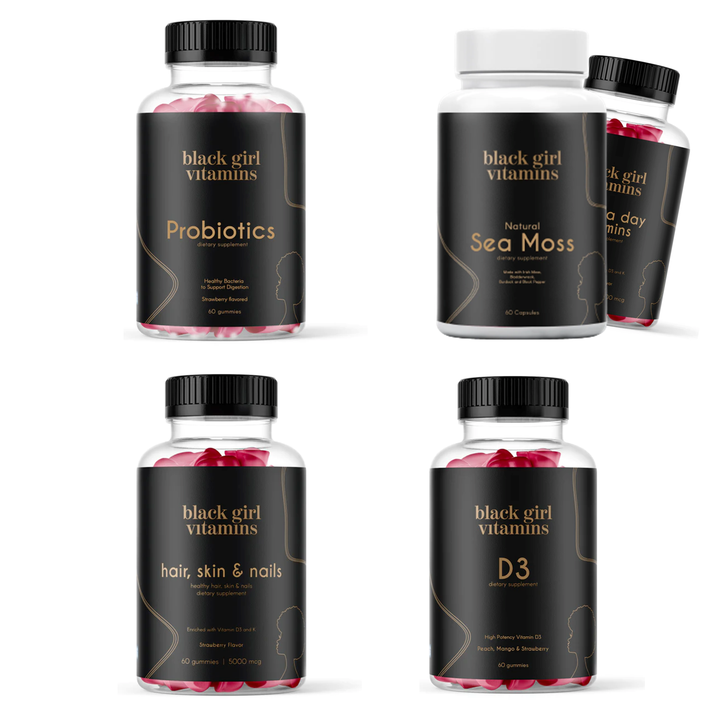How To Improve Gut Health for Black Women's Wellness Journeys
Did you know gut health plays an important role in your overall well-being, influencing everything from digestion to mental health? Maintaining a healthy gut isn’t only about managing digestive health. It’s also about supporting your wellness journey as a whole.
When you understand how to improve gut health, you can take control of many aspects of your health and improve your quality of life.
What Is Gut Health?
Your gut, often called the digestive tract, is home to trillions of microorganisms. This number includes bacteria, viruses, and fungi.
Together they are called the gut microbiome and operate as a complex ecosystem that influences your digestion, mental health, and immune function. Maintaining a healthy balance of these microbes can impact your overall health significantly, making it essential for you to adopt strategies that promote a healthy gut.
Gut health includes both your intestine and the gastrointestinal tract. Maintaining a well-balanced gut microbiome improves your digestive health and nutrient absorption, and supports a robust immune system.
Poor gut health occurs when the balance of good bacteria and harmful microorganisms becomes disrupted. This can lead to a range of issues you may experience as constipation, bloating, and irritable bowel syndrome (IBS). Gut health has also been linked to mental well-being, hormones, and immune function.
What Are the Challenges of Gut Health for Black Women?
Factors such as diet, healthcare access, and cultural practices can all influence the gut health of Black women. Traditional diets in the Black community often include ultra-processed foods, which can disrupt the balance of your gut microbiome and contribute to poor gut health.
Eating too many refined carbohydrates and not enough fiber-rich foods can worsen symptoms such as constipation. Limit sugar and artificial sweeteners, as including too much in your diet can lead to dysbiosis, where the balance of good bacteria and harmful microbes is disrupted.
Chronic stress and racial trauma can also negatively impact your digestive health. Studies show stress disrupts the balance in your gut ecosystem and can directly influence your stress levels, mood, and overall mental health.
This connection, called the gut-brain axis, is associated with an increased risk for mood disorders. Meditation, regular physical activity, and other stress management techniques can help reduce these effects and support your gut health.
How Can I Improve My Gut Health?
If you want to learn how to improve gut health, you need to start by understanding probiotics and fiber-rich prebiotics.
Probiotics
Probiotics are live beneficial bacteria you can introduce to your body by eating probiotic foods such as fermented sauerkraut, kefir, kombucha, and kimchi. You could also explore and experiment with making traditional African fermented foods and probiotics. Any of these can help replenish your gut microbiota and help restore balance.
Prebiotics
Prebiotics are the food the beneficial bacteria in your gut eat and are essential for promoting their growth and maintaining a healthy microbiome. Many traditional foods for the Black community, such as lentils, chickpeas, and whole grains, are excellent sources of fiber and prebiotics. Eating more of these foods in your daily meals can help improve your gut health.
Including a variety of these gut-friendly foods can support a healthy gut microbiome.
You’ll also benefit from staying hydrated and adding foods like berries, nuts, and green tea to your diet.
These foods have plant compounds called polyphenols that promote the growth of beneficial gut bacteria. They may also have soothing properties.
Can Probiotic Supplements Help Gut Health?
High-quality supplements can help address specific deficiencies and support your gut health.
Let’s take a look at your options:
Probiotic Supplements
Probiotic supplements contain live beneficial bacteria that may help restore and maintain a healthy gut microbiome. They are often used to help manage conditions like IBS and constipation.
Digestive Enzymes
Digestive enzymes can help your body break down food more effectively, potentially reducing symptoms such as heartburn and bloating. You may find these helpful if you struggle to digest certain foods.
Fiber Supplements
Fiber supplements may support overall digestive health and regularity if you struggle to get enough fiber in your diet. If you want to support your bowel health and reduce constipation, look for supplements that contain natural fibers, such as inulin or psyllium husk.
Vitamins and Minerals
Calcium, vitamin D, and magnesium all play a role in maintaining a healthy gut. If you’re not getting enough of these through your diet, you may want to consider taking a supplement.
Healthy Gut, Better Life
Using a combination of dietary strategies, supplements, and lifestyle changes can help you improve your digestive health and overall quality of life. You can further support these goals by managing stress, staying active, and prioritizing sleep.
Making these investments in your long-term wellness can help you manage symptoms while living your best life.
Sources:
Gut Microbiota’s Effect on Mental Health: The Gut-Brain Axis | National Library of Medicine
African Fermented Foods and Probiotics | International Journal of Food Microbiology
Dietary Polyphenol, Gut Microbiota, and Health Benefits | National Library of Medicine











